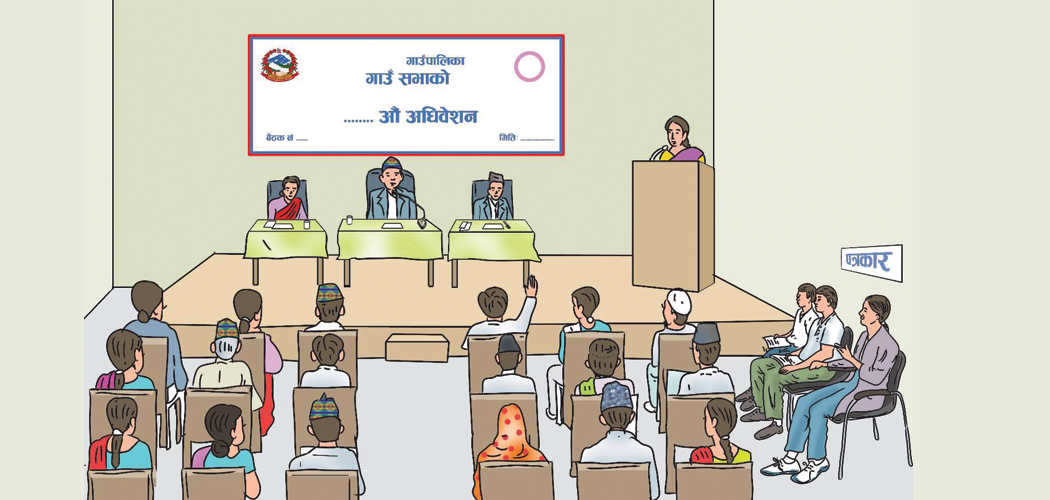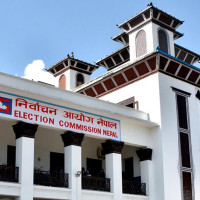- Sunday, 1 March 2026
Weak Local Levels May Undermine Federalism
Mukti Rijal
The conference as it was slated discussed several themes and subthemes related with empirical and normative aspects of the federalism. As Nepal was grappling then with the process of writing the federal constitution under the aegis of the popularly mandated constituent assembly, the country was set to enter to the league of the federations. It had been looked with keen interest, excitement and curiosity by the federal countries worldwide.
Different federal countries where their variant of federalism was successfully implemented had eagerly extended knowledge and expert support and assistance to define and set the narratives for federal restructuring in Nepal. Key Constituent Assembly (CA) members, officials and experts, civil society leaders were invited for the study, learning and exposures in such federal democracies like Switzerland, Canada and India and new semi-federal nations such as South Africa so on.
Forum's Delhi Summit
Likewise, in the New Delhi summit of the Forum of federations, some select Nepalese jurists, political science scholars and civil society leaders were invited as attendees with a view to endow them with a meaningful exposure on the deliberation on different thematic areas of federalism in the summit.
I was among the civil society delegates to participate in the event. In those times and even long after the summit, I have taken part in several events on both normative and empirical aspects of federalism organized in Nepal with the support of the Forum of Federations.
Needless to say, the Forum – a membership based organization - is a global network committed to federalism and devolved governance in which the federal countries or would be federal nations are generally anticipated and invited to join as its member partners. Less than a dozen federal nations, are its members so far.Currently, the Forum's member countries include Australia, Brazil, Canada, Ethiopia, Germany, India, Mexico, Nigeria, Pakistan, Switzerland and so on.
these political parties tend to gloss over the fact that India had to take recourse to constitutional amendment to accord constitutional recognition to the local government, and endow them with important functional mandates and competencies.
The Forum, according to the website sources, has field offices and or representation in such countries like Brazil, Ethiopia, Germany, India, Jordan, Morocco, Myanmar, Nepal, Pakistan, and Tunisia.
Established by the government of Canada in 1999, the Forum aims at bridging the worlds of academic research and federation's real world practices. Its activities are claimed as to continuously inform and renew its body of cutting edge intellectual capital and resources on varied aspects of multilevel governance. The opening session of the New Delhi Summit held at the famed Bigyan Bhawan was an exercise of heightened discursive breadth and depth in which head of states or government of some of the federal countries had shared their observation and insights into the working of federalism in their respective countries.
Particularly striking and thoughtful for this writer was, among others, the presentation made by Indian president APJ Abdul Kalam and the address by the former prime minister of India Dr. Manmohan Singh.
President Kalam in his multimedia presentation had emphasized on the need for redrawing the map of states (Pradesh) in India on ecological basis for integrated use and utilization of resources and saving India from ecological destruction.
Dr. Singh pointedly remarked that in most of the cases resolution of problems between centre and state acquires an excessively political pretensions, and narrow perspectives based on regional or sectional loyalties and ideologies which distorts the national vision and sense of collective national purpose.
He further added, "In a world of multi-ethnic, multi-cultural plural societies, federal political systems face new political tensions and conflicts. Managing this tension is the challenge for federalism".
The erudite soft-spoken Indian Prime minister had made the observations at the backdrop of recurring tensions and conflicts between centre and states in the implementation of some
policies and programs in which center had had bigger stakes imbued with long term perspectives.
The centre's vision for progressive social transformation backed up by social justice driven schemes failed to reach out to the intended beneficiaries because of the myopic short term sectional priorities of the Pradesh (state) governments, and often times the earmarked budget is siphoned off to the non-productive sectors, or misappropriated in contradistinction to the centre's vision.
Ill-Conceived Schemes
The populist schemes of state governments that are ill conceived have been a headache to the central government that are said to be responsible for draining off resources and undermining macro-economic stability. Centre-state tensions have remained a cause of disagreement in India on several issues of significance including resources allocations and policy implementation.
Recently, in a high level meeting held with Prime minister Narendra Modi, secretaries of the government of India took issues of the unscrupulous public spending of the state governments. The secretaries while citing the populist schemes announced in the states contrary to the national policy, which are in financially bad shape had told that these schemes were economically unsustainable and could take the states down the same path as Sri Lanka.
The Forum – a membership based organization - is a global network committed to federalism and devolved governance in which the federal countries or would be federal nations are generally anticipated and invited to join as its member partners. Less than a dozen federal nations, are its members so far.
Some of the state governments in India which have been called as Bimaru or sick states (Bihar, Madhya Pradesh, Rajasthan and Uttar Pradesh ) are especially known for their lackluster response to the concept of decentralized self governance and democratic participation of citizens. In the constitution of the Republic of India, the mandate to reorganise and create democratic local government institutions at the grassroots is entrusted to the state (Pradesh) government.
It was in contradiction to what Mahatma Gandhi dreamed of extending democracy to the grassroots levels and this dream, according to him, can be realized only through the empowered and competent local government institutions entrusted with an elaborate constitutional entrenchment. Mahatma Gandhi's conviction was that if the rural, semi-urban and urban areas could be managed by strong local government institutions having full powers with constitutional backing, India will be self-reliant and self-sufficient which all that people want.
The minimum standard of living can be assured to all people through empowered local governance where a person has the maximum freedom and the opportunity to develop his or her personality.
No Direct Say
The centre has no direct say and no reach out to the local governments. And, it is intermediated by Pradesh (states). Neither have local governments any direct access to the center as they have to operate and function under the tutelage of the states. However, state governments had failed in their duty to empower the local bodies in the spirit of local self-governance as this would demand devolving power and resources to the lower levels. Some states like West Bengal, Kerala, Karnataka had created the local governments. but the system had inherent weaknesses like the inability to be a people’s democratic government responsive to their needs and aspirations.
Local governments were weakened in India particularly due to a variety of factors like the lack of proper institutional arrangement, dearth of financial resources, no regular elections and inadequate representation of the weaker sections like scheduled castes and scheduled tribes and women in these institutions. In the states like Bihar and Orissa, neither did state (Pradesh) governments enact the proper law nor held local elections for decades thus denying the rural communities their right to self-governance and participatory development.
In order to address these issues and strengthen local governments through an elaborate constitutional provision, the central government under the leadership of late Rajiv Gandhi brought about the 73rd Amendment Act in 1992. The act was passed in both houses and entered into force from 24 April 1993.
This Act catapulted the local government institutions into status of constitutional bodies taking due cognizance of the fact that leaving them under the statutory arrangement, supervision and coordination of the Pradesh (states) had engendered institutional fragility and hindered their democratic growth and development. The amended provision of the constitution made it compulsory for every state government to establish local governments in their territories and devolve powers, responsibilities and authority to the local bodiesas enshrined in the schedule of the constitution.
Local governments have a fixed tenure of five years. State election commissions have been provided with the mechanism to conduct independent elections to the local bodies. The constitutional amendment gives provisions for the due representation of women and marginalized groups in local governments. The State Finance Commission is also required to evaluate the financial position of the local governments every five years. Thus, the passing of the 73rd Amendment has improved and strengthened local self-governance in India and ensured due representation of the marginalized groups. In order to celebrate this and give further impetus to the local government institutions, the government of India has decided to observe 24 April every year as the national local government day.
However, in Nepal, some political parties like People's Socialist Party (Janata Samajbadi Party) and Democratic Socialist Party (Loktantrik Samajbadi party) plead for constitutional amendment with a view to take away some of the constitutionally allocated mandates and competencies of the local government institutions and re-centralize to buttress the authority of the Pradesh (state) governments.
Similar to the institutional arrangement that was made in Indian Constitution when it was drafted, these parties seem to be in favor of bringing the local governments under the control and supervision of the state (Pradesh) governments to roll back the institutional arrangement accrued in favor of devolved local democracy.
Furthermore, these political parties tend to gloss over the fact that India had to take recourse to constitutional amendment to accord constitutional recognition to the local government, and endow them with important functional mandates and competencies. In India at the time of writing the constitution, plea made by Mahatma Gandhi for local self- government institutions as the key pillar of the federal governance did not receive much needed attention and priority of the framers.
Nevertheless, having suffered a bitter taste of democratic deficit at the local level, India finally recognized to the need to amend the constitution to vest in local government institutions critical governing roles and functions after more than four decades of the promulgation of the constitution of the Republic of India.
Scaling Down
The argument in regard to scaling down the mandates and competencies of the local government institutions with a view to bring them under the purview of the Pradesh (state) does not fit in with the concept of the principle of subsidiarity- the key guiding norm for distribution of competencies in federal system.
The concept of subsidiarity is premised upon the principle that central government should exercise powers only when it is necessary to achieve a particular nationally important objective. This is justified only when it adds value in comparison to what the governments of the constituent units(sub-national level) especially local government institutions could achieve on their own.
The federal constitution of Nepal vests in local governments, the powers directly derived from the constitution not as devolved by the states and functional autonomy to be limited under Pradesh (state) supervision and coordination.
This provision is in line with growing trend and tendencies followed in favor of building federalism at the local level, long appreciated and followed even in the classical federal countries like USA and Switzerland.
Any attempt to weaken the local government institutions in Nepal through constitutional amendment therefore goes against the evolving jurisprudence of entrenching local government with adequate powers and competencies.
(The author is associated with Policy Research Institute. rijalmukti@gmail.com)

















